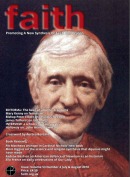
Reclaiming feminism for Christianity
Article:
01.07.18
Mary Kenny explores the truth of the relationship between
women and the Church
Earlier in the spring of this year, the former President of Ireland, Mary McAleese, mounted an attack on the Vatican, and the formal structure of the Catholic Church. She said that it had become “a primary global carrier of the toxic virus of misogyny” and “a bastion of patronising platitudes to which Pope Francis has added his own quota”. If the Vatican is a nest of misogynists, some of them were probably muttering subsequently that hell hath no fury like a woman scorned: Mary had been rebuffed by the Vatican in her efforts to contribute to a Rome conference on the status of women in the church. (Though it was probably more because of her “unorthodox” role in supporting same-sex marriage in Ireland than because she is a woman.)
Institutions
Almost every institution I have known during my lifetime has been, if not downright misogynistic, then male-dominated, with the exception of the Irish Countrywoman’s Association and the Women’s Institute. Wait - there’s another exception: the convent school at which I was educated. The entire order was run by women at every level, from the mission fields of India to the (very capable) accounts department in Dublin. As a young feminist in the late 1960s, I was puzzled by the assertion which I found in both British and American literature that “the only choice” that women had in life was to be married and to have children. But I had been surrounded by consecrated virgins who seldom mentioned marriage as a woman’s aim in life - while they never stopped mentioning the importance of passing exams. The favoured schoolgirl in our class was the one who always came top in everything, especially maths.
Education, trade, arts, pubs, clubs
Out in the real world, to which I was soon propelled, all public institutions were indeed “male bastions”, from the BBC to the political establishment, from education to trade, from the arts to pubs and clubs. On the occasion when I went off to interview the author Kingsley Amis at the Garrick Club, I was - as were all other females - obliged to ascend to the bar by a special ladies’ back staircase. Women were disallowed from using the main front stairs. When I got to share a glass with Kingsley he expressed misogynist views that were not particularly uncommon among men of his generation: “Women are trouble!” he harrumped. “Never let them into the institutions – they’ll make trouble!”
Feminists
As young feminists we strode forth to disprove this, and to show that we were entitled to our rights in public life. Society had been too much separated along the lines of men controlling the public sphere, while women usually dominated the sphere of family and private life – or, as we would have put it, were “relegated” to home and family. Many anthropologists would have made this observation universally: males and females in virtually all societies have been separated according to sex-specific roles. In some societies, women have had to do the back-breaking work in the fields, while menfolk sat under the olive tree and discussed the state of the world (I actually saw this in Albania when it was still under Communist rule).
Christianity
And yet, it is reasonable to suggest that Christianity, from its inception has sought to advance the status of women: it had a feminine and maybe even a feminist sensibility from the start, and it is not surprising that, from the Roman matrons to the contemporary evangelical missions in less developed countries, it has usually been women who were the first to become Christians.
It is a constant theme in feminism that the voices and the lives of women are hidden from history, and yet, if you want to find women’s voices and accounts of women’s lives in the past, you will find them in the lives of the saints. And whereas most historical biography of the past focuses on the upper classes, on kings and emperors or outstanding military commanders, the lives of the saints quite often shine a light on entirely humble people.
Stories
Here, for example, at the very end of the alphabet is St Zita, a domestic servant, born in Lucca in Italy in 1218. She became a household maid at the age of twelve, working for a wealthy weaver’s family, and remained a serving maid all her life. But her exemplary character and care for the poor won her respect at her death aged 50, she was popularly regarded as a local saint and a patroness of maid-servants.
This is a story of a young woman whose life would have gone entirely unrecorded were it not for the fact that she was revered for her holiness and the care that she gave to her community. At the other end of the social scale we have Brigid of Sweden who was born into a noble family and retained that status: but hers was also a remarkable life and gives us much insight into the power and command that was sometimes available to Christian women. They travelled so much! They gave counsel to kings and popes. (Mary McAleese did make the point that St Catherine of Siena, in the 14th century, took a major role in guiding papal counsels.)
The Church attracted women from the start
Christianity has been, arguably, less misogynistic than many worldly institutions since it attracted women from the beginning, insisting on the value of each individual life and thus on the spiritual equality between all. True, some of the early fathers, being very fearful of sexuality – whose excesses, perhaps, they associated with the decadence of the Roman Empire – were somewhat bombastic about the temptations that women’s sexuality represented to them. But holy women continually arose in the canons of Christianity – think of Hildegarde of Bingen, or Julian of Norwich – and it is a feature of Catholic churches and places of worship that the feminine is always present, from the BVM to St Theresa and St Therese, from St Rita (a particular French and Italian favourite) to St Bernadette (a frequent presence in Irish grottos).
Feminism today
Feminism today is sometimes seen as a materialistic movement with an aggressive attitude to abortion and a contemptuous view of men, but the Victorian roots of modern feminism were strongly influenced by Christianity, and many of the early feminists were committed Christians. Among the Suffragette generation, and the education pioneers which preceded them, a striking number of early feminists were Christians – and not unusually, from clerical families. Millicent Fawcett was much influenced by Josephine Butler, a strong Christian who campaigned, successfully, against the prostitution of women and the selling of young girls (and got the age of consent raised from 12 to 16). The American founding feminists like Susan B. Anthony and Elizabeth Cady Stanton were Christian campaigners for the abolition of slavery.
In the US today, Feminists for Life – feminists who champion the pro-life cause – have shown that the pioneering American feminists like Susan B. Anthony were wholehearted opposed to abortion campaigners, affirming that it diminished women to advocate the destruction of the unborn.
Christian women’s achievements
Christian missionaries helped to free women in China from foot-binding, and they opposed the infanticide of girl babies which, alas, had a long history in China. Irish nuns set up dedicated Chinese orphanages to save the girl infants abandoned by the roadside (baptising many of them Brigid). In Africa, Christian missionaries were opposing Female Genital Mutilation in the 1920s, much to the ire of the founder of modern Kenya, Jomo Kenyatta, who fiercely criticised them for “meddling” in native practices. But surely they were right to “meddle” in this cruel cutting of young girls.
The role that nuns like the Ursulines – founded by St Angela de Merici in the 15th century – played in the education of women is now seldom acknowledged, though it became the template for the campaigns for girls’ education in the 19th century: nor of the pioneering work that nuns did in health care – Florence Nightingale was within an ace of becoming a Catholic so that she could join the nursing sisters that she had seen in France. Holy women were opening refuges for deserted wives, or wives cruelly treated by violent men as long ago as the 12th century.
Relationship
There’s much in contemporary feminism which is hostile to Christianity, and other forms of faith, and perhaps because of that an adversarial relationship has developed. But that doesn’t mean to say that many of the ideas within feminism are opposed to Christianity: many of the ideas of feminism came from Christianity.
Rather than castigating the Holy See for transmitting “the virus of misogyny” should we not reclaim the traditions of Christian feminism, discuss them, develop them - and own them?
Notes:
Mary Kenny was a founder member of the Irish Women’s Liberation Movement in 1971. Her most recent book is: “Am I a Feminist? Are You?” (New Island, Dublin.)





